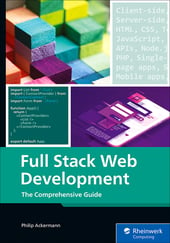In the dynamic world of software development, full stack development has emerged as a powerful resume builder, showing that a developer has versatility and proficiency across both front-end and back-end technologies.
Full stack developers, armed with this comprehensive skill set, play a pivotal role in creating end-to-end solutions that seamlessly integrate user interfaces with robust server-side functionalities. In this blog post, we will delve into the concept of full stack development, explore the skills required, discuss its advantages, and shed light on the growing importance of full stack developers in today's tech landscape.
Defining Full Stack Development
Full stack development refers to the practice of mastering both front-end and back-end technologies, allowing developers to work on the entire software stack – from crafting user interfaces and enhancing user experiences to managing server-side logic, databases, and server infrastructure. A full stack developer possesses a well-rounded skill set, eliminating the need for separate specialists in front-end and back-end roles.
The full stack skill set includes the following technologies.
Full stack developers are proficient in creating visually appealing and responsive user interfaces using a combination of front-end technologies: HTML for structure, CSS for styling, and JavaScript for interactivity. Knowledge of popular front-end frameworks like React, Angular, or Vue.js enables full stack developers to build dynamic and efficient user interfaces.
On the back-end, full stack developers are adept in server-side languages such as Node.js, Python, Ruby, Java, or PHP, depending on project requirements. They understand database management systems like MySQL, MongoDB, or PostgreSQL for efficient data storage and retrieval. Proficiency in server management, deployment, and cloud services is crucial for handling the back-end infrastructure.
Full stack developers often utilize version control systems, such as Git, to track changes, collaborate with team members, and manage code repositories effectively. They also work with APIs, which are essential for communication between different software components, enabling seamless integration of services. Lastly, a deep knowledge of web architecture and design patterns ensures that full stack developers build scalable and maintainable applications.
Learn more tools of full stack development here.
Advantages of Full Stack Development
Full stack developers possess the ability to work on both ends of the spectrum, streamlining the development process and reducing dependencies on multiple team members. Because full stack developers have a comprehensive understanding of the entire development cycle (from conceptualization and design to implementation and deployment), employers get a holistic approach to problem-solving and project execution.
Full stack developers are able to bridge the communication gap between front-end and back-end teams, facilitating smoother collaboration and ensuring that the entire development team operates cohesively. This is great when a project needs quick prototyping and iterative development, allowing full stack developers to test and refine both front-end and back-end components concurrently.
For smaller projects or startups, having a full stack developer can be cost-effective, as it eliminates the need for separate specialists for front-end and back-end development.
The Importance of Full Stack Developers
As businesses seek agile development practices and versatility in their teams, full stack developers are in high demand. Their ability to contribute across the entire stack makes them valuable assets in dynamic and fast-paced environments. Their ability to wear multiple hats accelerates development cycles and ensures the delivery of fully functional applications.
Full stack developers are often quick to adapt to emerging technologies and frameworks, allowing them to stay ahead in an ever-evolving tech landscape. Their diverse skill set positions them to embrace new tools and trends seamlessly.
In collaborative settings, full stack developers act as bridges between different specialized teams. Their understanding of both front-end and back-end technologies facilitates effective communication and collaboration.
Conclusion
Full stack development stands as a testament to the evolving nature of software development, emphasizing the importance of versatile and adaptable professionals. The power of full stack development lies not only in the ability to write code, but in the capacity to architect end-to-end solutions that meet both user interface and server-side requirements. As businesses continue to seek efficiency, agility, and holistic development approaches, the role of full stack developers becomes increasingly vital in shaping the digital landscape of tomorrow. Whether crafting engaging user interfaces or architecting robust server infrastructures, full stack developers are the architects of seamless and integrated digital experiences.




Comments